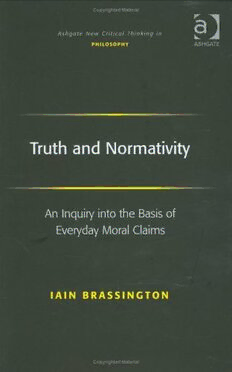
Truth and Normativity: An Inquiry into the Basis of Everyday Moral Claims PDF
195 Pages·2007·1.917 MB·English
Most books are stored in the elastic cloud where traffic is expensive. For this reason, we have a limit on daily download.
Preview Truth and Normativity: An Inquiry into the Basis of Everyday Moral Claims
Description:
Beginning by posing the question of what it is that marks the difference between something like terrorism and something like civil society, Brassington argues that commonsense moral arguments against terrorism or political violence tend to imply that the modern democratic polis might also be morally unjustifiable. At the same time, the commonsense arguments in favour of something like a modern democratic polis could be coopted by the politically violent as exculpatory. In exploring this prima facie problem and in the course of trying to substantiate the commonsense distinction, Brassington identifies a tension between the primary values of truth and normativity in the standard accounts of moral theory which he ultimately resolves by adopting lines of thought suggested by Martin Heidegger and concluding that the problem with mainstream moral philosophy is that, in a sense, it tries too hard.
See more
The list of books you might like
Most books are stored in the elastic cloud where traffic is expensive. For this reason, we have a limit on daily download.
